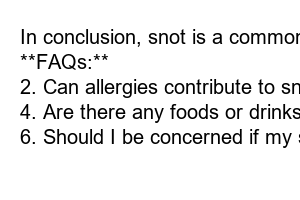코딱지가 자주 생기는 이유
Have you ever wondered why **snot** seems to be a common occurrence in English? Let’s dive into the reasons behind this **unpleasant** symptom and what you can do to find relief.
**What causes snot in English?**
Snot is often the result of **irritants** in the environment, such as pollen or dust, that trigger an **immune response** in the body, leading to increased mucus production in the nose.
**How does snot form?**
When the body detects these irritants, it signals for the production of **mucus** to trap and remove them from the body. This mucus can be expelled through the **nose** as snot.
**Why do we produce snot?**
Snot plays a crucial role in **protecting** the body from harmful substances in the environment. It helps to **moisten** the air we breathe and traps germs and particles before they can enter the body.
**How can you manage snot?**
Drinking plenty of **water** and using a **humidifier** can help to thin mucus and make it easier to expel. Over-the-counter **decongestants** can also provide relief from congestion.
**When should you see a doctor about snot?**
If you experience **persistent** or severe snot, it may be a sign of an underlying **allergy** or infection. In these cases, it’s important to consult with a healthcare professional for an accurate diagnosis and treatment plan.
**What are some home remedies for snot?**
In addition to staying **hydrated** and using a humidifier, steam inhalation, saline nasal sprays, and nasal irrigation can help to clear out excess mucus and provide relief from congestion.
**Summary:**
In conclusion, snot is a common symptom in English that is often caused by irritants in the environment triggering an immune response in the body. Taking steps to stay hydrated, use a humidifier, and seek medical advice for persistent or severe symptoms can help manage snot and improve overall **respiratory** health.
**FAQs:**
1. What causes excessive snot production?
2. Can allergies contribute to snot production?
3. How can I differentiate between a cold and allergies when experiencing snot?
4. Are there any foods or drinks that can help reduce snot?
5. Is it normal to have snot all year round?
6. Should I be concerned if my snot changes color?

